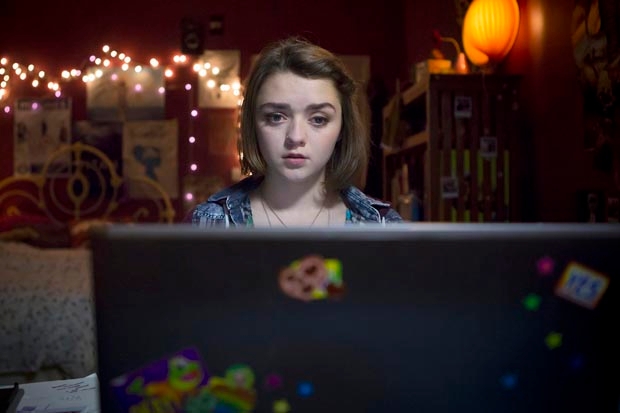Channel 4’s Cyberbully (Thursday), written by Ben Chanan and David Lobatto, turned out to be a brilliantly gripping drama, even if the average middle-aged viewer might have found the early scenes as baffling as Finnegans Wake. Teenage Casey Jacobs (Maisie Williams) was alone in her bedroom, although not in the way we used to be: with an LP playing and the latest NME to hand. Instead, she was skyping her friend Megan (‘Hey, bitch,’ they greeted each other cheerfully), while also tweeting, texting, instagramming and wondering who’d hacked into her Spotify playlist and replaced all the good stuff with dreary old Led Zeppelin.
But then she saw a tweet from her ex-boyfriend Nathan: ‘I’m not surprised Casey Jacobs is on anti-depressants. I spent one night with her and it fucking depressed me.’ And with that, she started an online chat with her geeky pal Alex, successfully urging him to hack into Nathan’s Twitter account so she could take revenge.
Except that as she and Alex chatted on, it became clear he wasn’t Alex at all, but someone much older. (Sad to say, the giveaway was his use of the apparently obsolete acronym, ‘Lol’.) Once rumbled, he switched to communicating in a synthetic voice and announced, ‘I help victims of cyberbullying’ — which didn’t prove as comforting as it sounded.
Despite his embarrassing elderliness, the mysterious whoever-it-was certainly knew about computers — for, as Casey realised with mounting horror, he’d taken over hers completely. Not only was he watching her through her webcam, but he’d found her most embarrassing files and threatened to post naked photos of her if she switched him off. And he was there not because Casey was a victim, but because she qualified as a bully, having casually slagged off other people’s online videos, especially those of Jennifer Li, a schoolmate whose tuneless crooning she’d labelled ‘When singers are too deluded for X Factor’.
At first, Casey was disposed to bullishness. ‘That’s how I know you’re old,’ she explained in words to chill the heart of any parent watching. ‘You don’t get it. It’s not OK, but it’s normal, it happens, we deal with it.’ The trouble was that Jennifer hadn’t. As the cyber-stranger revealed, Casey’s initial comment had opened the way to more ferocious trolls who repeatedly informed Jennifer that she was an ugly loser who should kill herself. Even when she posted pictures of her self-harming injuries in a bid to be left in peace, the comments ranged from ‘A lame effort’ to ‘Attention-whoring bitch’. Her final video was particularly hard to watch — a public suicide note about how she sang mainly to remind her of her mother, who died when Jennifer was 11.

Yet, for all its crunching topicality, this was at heart an almost old-fashioned piece of television — and not merely because it was an example of that allegedly defunct genre, the one-off play; or even because it was a very well made one, deftly shifting our sympathies throughout (with the aid of Maisie Williams’s dazzling central performance) and full of genuine menace. More strikingly, it had an unashamed moral purpose, with viewers left in no doubt as to the Authors’ Message: that supposedly harmless bantering mightn’t be so harmless when you copy in the entire world. Let’s just hope that some of the target audience left their computers for long enough to hear it.
Also on Thursday was Death in Paradise (BBC1) — which, by my reckoning, is the worst programme I almost never miss. As far as I can work out, the appeal is not so much the Caribbean setting or the impressive line-up of guest stars oddly willing to fly out to an island in the sun for the filming. It’s more that, somehow reassuringly, the show is the same every week. (Think Scooby-Doo for adults.) Not even a change in the main character two series ago greatly altered anything, with one eccentric but brilliant, fish-out-of-water, exaggeratedly English detective having replaced another.
Sure enough, Thursday’s episode began with a spot of slapstick as DI Humphrey Goodman (Kris Marshall) reminded us of his clumsiness by knocking his coffee over and wearing odd socks — a mistake considered so hilarious that it became a running gag. Meanwhile, of course, there’d been a mystifying murder with a strictly limited number of suspects which Humphrey duly cleared up in the traditional way. For a while, he dropped things and fell over as his colleagues rolled their eyes in good-natured exasperation. He then had a sudden epiphany, said something enigmatic (in this case, ‘the answer to the riddle is a riddle’), gathered the suspects and gave us the deeply implausible solution. As ever, I ended the programme with a slight but unmistakable feeling of self-disgust at having wasted an hour — pretty much, I imagine, as I will after watching next week.






Comments